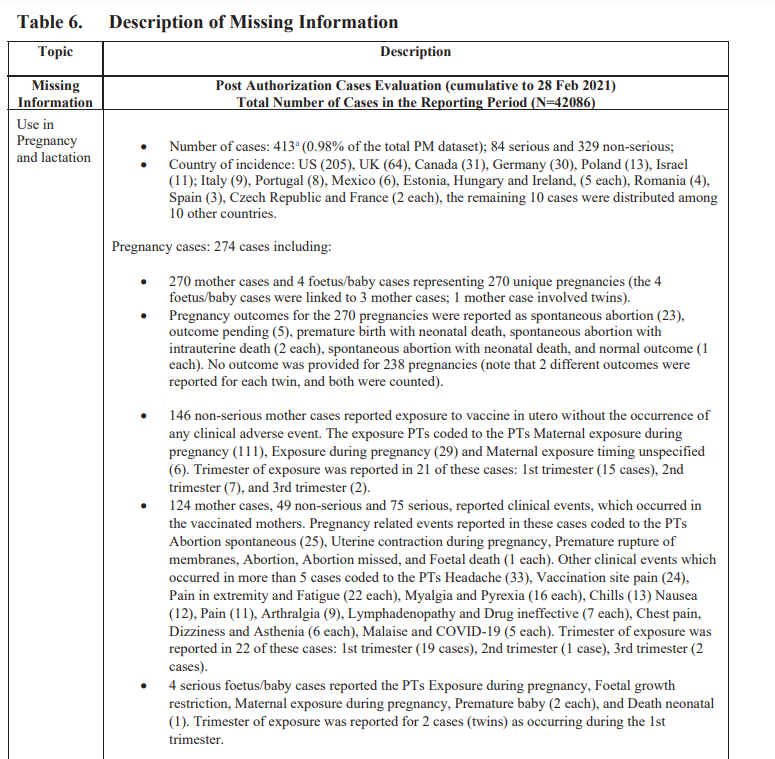As we all know, there is much conflicting information on the internet about the safety of the Pfizer mRNA vaccine during pregnancy. Official health sources recommend the Pfizer vaccine as safe for pregnant women and their babies (for example, US Centers for Disease Control, https://www.cdc.gov/coronavirus/2019-ncov/vaccines/recommendations/pregnancy.html). On the other hand, many sources suggest grave danger from the vaccine to pregnant women and their babies (for example, https://dailyexpose.uk/2022/05/09/confidential-pfizer-docs-90percent-pregnancies-miscarried/).
The fact is that women who receive the Pfizer mRNA vaccine may be putting their unborn babies at a very high risk of dying during the pregnancy. So why do Pfizer and the FDA continue to recommend that pregnant women receive the Pfizer mRNA vaccine?
To understand the increased risks, we need to understand first what is normal; that is, how often does a baby die during an unvaccinated woman’s pregnancy? Early in a pregnancy, miscarriage or spontaneous abortion (the death of a baby before 13 weeks gestation) happens in 1 of 10 (10%) pregnancies (https://www.acog.org/womens-health/faqs/early-pregnancy-loss). Later in a pregnancy, the risk of a baby dying decreases dramatically: stillbirths (the death of a baby after 20 weeks gestation) occur in 1 in 160 (0.6%) pregnancies (https://www.marchofdimes.org/complications/stillbirth.aspx).
These are the normal background rates of in utero death. Yet after mothers receive the Pfizer mRNA vaccine, in utero deaths appear to be much, much higher. The truth lies in Pfizer’s own documents submitted to the US Food and Drug Agency.
Following FDA’s initial emergency use authorization of Pfizer’s mRNA vaccine on December 11, 2020, Pfizer was required to submit periodic reports of side effects (adverse events) from the vaccine. In its April 30, 2021, adverse event report to FDA, Pfizer analyzed the effects of the vaccine in patients around the world (https://www.phmpt.org/wp-content/uploads/2022/04/reissue_5.3.6-postmarketing-experience.pdf). Although the conclusion of this report states that “review of the available data . . . confirms a favorable benefit:risk balance” for the Pfizer mRNA vaccine (p. 29, https://www.phmpt.org/wp-content/uploads/2022/04/reissue_5.3.6-postmarketing-experience.pdf), the details of the report tell a different story for the babies of pregnant women who receive the vaccine.
Pfizer reported that pregnancy outcomes were available for only 32 of 270 pregnancies and 4 associated fetus/baby cases (p. 12, https://www.phmpt.org/wp-content/uploads/2022/04/reissue_5.3.6-postmarketing-experience.pdf). In these 36 cases, 28 babies (78%) died after their mothers received the Pfizer mRNA vaccine. Pfizer and the FDA knew by April 2021 that the babies’ mortality rate may have been much greater than normal. This is a serious claim, so it’s important to explain where this number comes from.
Pfizer’s Table 6 (excerpted in Fig. 1, below) notes that 124 of 270 vaccinated mothers (46%) experienced adverse or serious adverse events. A total of 75 of these mothers (28%) and 4 additional unborn babies or neonates were reported to have had serious adverse events after the mothers received the mRNA vaccine. Of the 36 babies for which Pfizer knew the outcome, 25 died before birth and 3 died at birth. The babies’ deaths are categorized as follows:
- 23 spontaneous abortions
- 2 spontaneous abortions with intrauterine death
- 2 premature births with neonatal death
- 1 spontaneous abortion with neonatal death
Thus 28 out of 36 babies with known outcomes died at or before birth—a crude mortality rate of 78%.This suggests a mortality rate much higher than normal (10% for early pregnancies; less than 1% for pregnancies that last longer than 20 weeks). But we must keep in mind that these data are incomplete; Pfizer reported no information on 238 babies. For a truly valid estimate of the mortality rate, one would need either the complete data set or a random sample. Pfizer collected neither.
Just the suggestion that more babies were dying during pregnancy should have raised alarms at Pfizer. Instead Pfizer concluded that the benefits of the mRNA vaccine were worth the risks of a pregnant woman losing her baby.
So the question remains: Why do Pfizer and the FDA continue to allow pregnant women to be vaccinated? They know that unborn babies may be at increased risk of death from the Pfizer mRNA vaccine. Why aren’t pregnant women warned of these risks?

